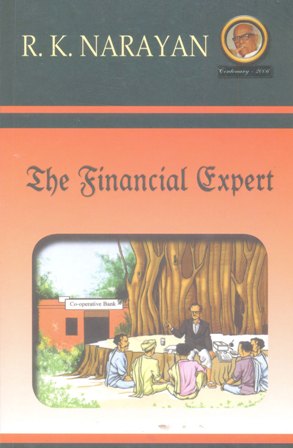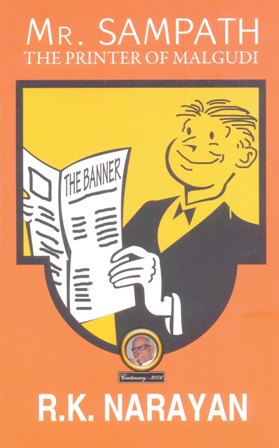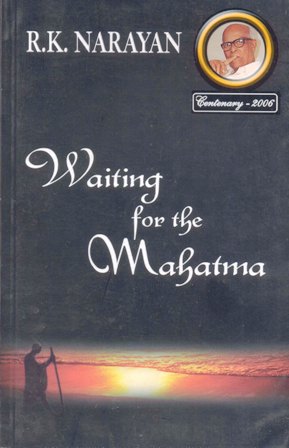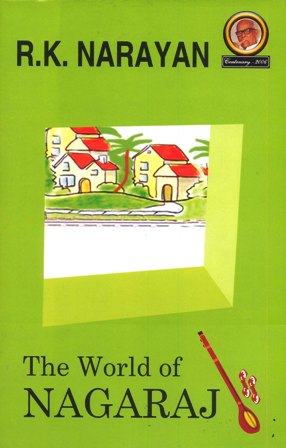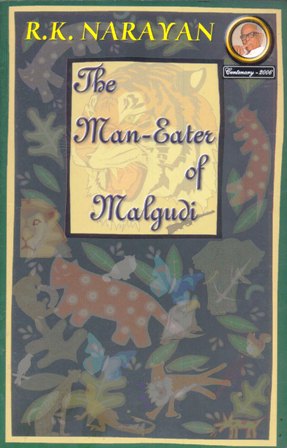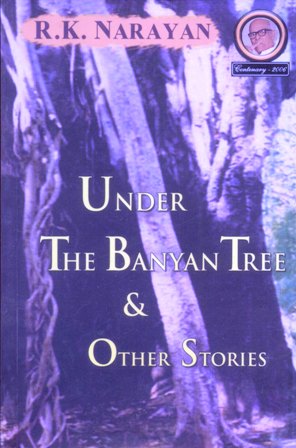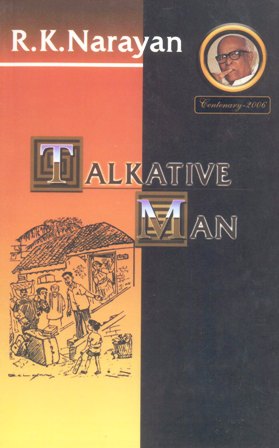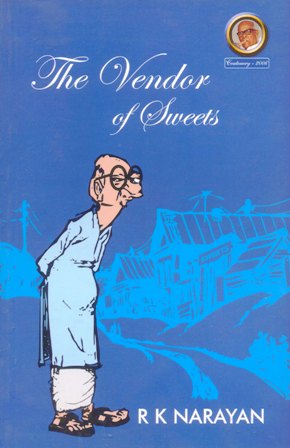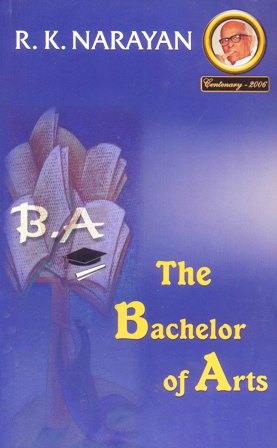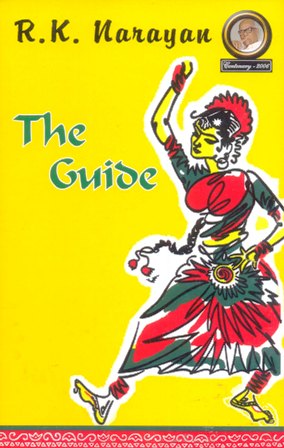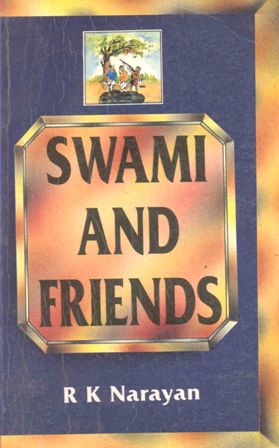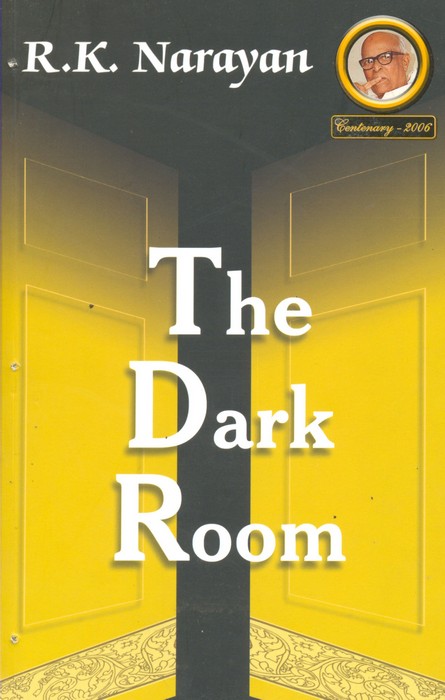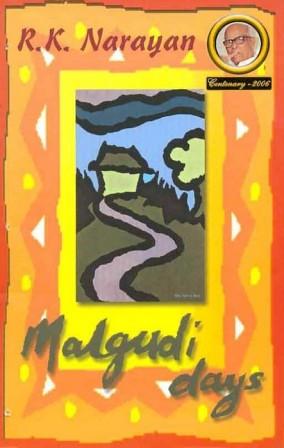-
The Financial Expert
The Financial Expert Margayya is a complex and entrancing character with a flair for those fabulously involved minor financial transactions which are an integral part of Indian life. We first met him sitting in the shade of a banyan tree, advising the people of Malgudi how to extract loans from the Co-operative Bank. A brush with the Secretary of the Bank, and an accident in which his spoilt son Balu throws his account book down a drain, cut short his career as a financier; but after a series of amusing incidents Margayya grows rich and reverts to financial wizardy. Apart from the vigor of the narrative, what is remarkable about the book is the unselfconscious ease and humour with which R K Narayan conveys the flavor of Indian life.
-
Mr. Sampath: The Printer Of Malgudi
Mr. Sampath: The Printer Of Malgudi Weekly publications of The Banner is entirely due to two dedicated Malgudi inhabitations: Srinivas edits the newspaper, while Mr. Sampath prints it. They work night and day to satisfy the increasing demands of their clamouring public. In rare moments of relaxation, Srinivas occupies his mind puzzling over the futility of human existence, while Mr. Sampath good-naturedly shoulders all the financial burdens. Without warming, The Banner suddenly folds. Never a character to be foiled for long, Mr. Sampath becomes involved with Sunrise Productions and ropes in Srinivas to write the film scripts. Unfortunately the glamorous life goes to Mr. Sampath's head and chaos ensues. At times amusing, unfailingly perspicacious, R K Narayan has written a story of great distinction and charm.
-
Waiting For The Mahatma
Waiting For The Mahatma Sriram is twenty. As a mark of his coming of age his grandmother allows his the pass-book to his savigns in the local bank, but Sriram is growing up in other ways, too, and an enchanting and unpredictable girl leads him into the entourage of Mahatma Gandhi. These are the opening events in R K Narayan's novel. It is the finest thing he has yet achieved, and his story of the triumphs and tragedies of a raw young zealot in the service of Gandhi is distinguished for its warmth, its humour, its lack of sentimentality and the stamp of absolute truth. Sriram's evolution into manhood is, for him, strange and bewildering process. Bharati, the girl he worship, is witty, infuriating, capable and, wonder of wonders, condescending to the moonstruck Sriram. Her first loyalty though, is to the Mahatma, a saint blessed with disconcerting common sense, a man whose tragedy is tat he is so much greater than his followers. Most of them accept his ideas enthusiastically, and without realizing it, pervert them to suit their coarser personalities. Sriram is inspired by Gandhi, but he is too easily influenced by glamorous patriots of the type of Jagadish, a terrorist. It is a tale of remarkable insight into the upsrge of Indian nationalism as witnessed through the eyes and hearts of Sriram and Bharati, and told with the all genius and compassion we have come to expect from R K Narayan.
-
The World Of Nagraj
The World Of Nagraj Nagaraj's world is quite and comfortable. Living in his family's spacious house with only his wife Sita for company, he fills his day writing letters, drinking coffee, doing some leisurely book-keeping for his friend Coomar's Boeing Sari Company, and sitting on his veranda watching the world and planning the book he intends to write about the life of the great sage Narada. But everything is disturbed when Tim, the son of his ambitious landowing brother Gopu, decides to leave home and come to live with Nagaraj. Forced to take responsibility for the boy, puzzled by his secret late-night activities and by the strong smell of sprits which lingers behind him, Nagaraj finds his days, suddenly filled with unwelcome complication and turbulence, which threaten to alter for ever the contented tranquility of his world. The latest of R.K.Narayan's magnificent Malgudi books, The World of Nagaraj is beautifully written, funny and haunting , evoking in marvelously rich detail the atmosphere of a small town in southern India and creating a magical world into which the reader is instantly drawn....
-
The Man-Eater Of Malgudi
The Man Eater Of Malgudi This is the story of Nataraj, who earns his living as a printer in the enchanted world of Malgudi, that slumbering Southern Indian village whose peace has been often amusingly and outrageously disturbed by Narayan. Nataraj and his close friends, a poet and a journalist, find their congenial days disturbed when Vasu, a powerful taxidermist; moves in with his stuffed hyenas and pythons, and brings his dancing women up the printer's private stairs. When Vasu, in search of larger game, threatens the life of a temple elephant that Nataraj has befriended, complications ensue that are both comic and calamitous. A not unwelcome death occurs; murder is suspected and Nataraj and his friends point guilty fingers at each other and those around them. The suspense never slackens in this bizarre, yet moving tale.
-
Under The Banyan Tree And Other Stories
Under The Banyan Tree And Other Stories A delightful collection from India's foremost storyteller, Under the Banyan Tree adds twenty-eight tales of the rich and colorful heritage of R K Narayan's fictional south Indian city, Malgudi. Narayan's characters, observed with a wry and compassionate eye, come from every area of Indian society - merchants, beggars, herdsmen, hermits, teachers, rogues - and represent in miniature a wealth of human experience. A rebellious young man refuses to honour a vow made by his parents in an ancestral temple long ago in Nitya. A shopkeeper is made bankrupt by a charming stranger in A Career. In other tales, a schoolteacher indulges for one traumatic day in the luxury of telling the truth; a nervous small boy, forced to sleep alone to prove his courage, catches a burglar; a browbeaten clerk triumphs over his stars, and a ghost is laid to rest. Outstanding in this superb book is the masterpiece A Horse and Two Goats, drawn from a collection now no longer available, and the marvelous title story, about the divine gift of storytelling itself. Like the storyteller in Under the Banyan Tree, R K Narayan is an enchanter, a weaver of words who keeps his audience spellbound with the rhythms and haunting images of his tales. Drawn from the market-place, the mountainside, the dusty street, the river bank, these gentle, ironic, finely observed stories of village and city life demonstrate the power of fiction at its best
-
Talkative Man
Talkative Man In this masterpiece, India's preeminent novelist introduces a character not unlike himself, a compulsively engaging raconteur-" They call me Talkative Man. Some affectionately shorten it to TM: I have earned this title, I suppose, because I cannot contain myself. My impulse to share an experience with others is irresistible." As a young journalist struggling to establish a reputation, TM is always on the lookout for a good story. The one he shares with the reader this time is about the mysterious Dr. Rann and his effect on the people of Malgudi-a world of "small men, small schemes, big talk, and limited means," as V.S. Naipaul aptly described Narayan's enchanting city. Dr. Rann arrives in Malgudi wearing a fancy blue suit and claiming to be researching a project for the United Nations. He inveigles TM into taking him to his home on Kabir Street, where he begins an extended visit as a house-guest. TM learns through local gossip that the secrete scholar is seducing one of Malgudi's young girls, and then a large woman from Delhi arrives and relates the amazing tale of her futile attempts to reclaim the same man, her erratic, wandering husband. In the novel's hilarious and touching denouement, TM realizes that not only he but also Dr. Rann and his implacable wife are all engaged in creating fictions about themselves and their lives....
-
The Vendor Of Sweets
At sixty Jagan is a prosperous widower, a sweet-vendor who contrives to combine handsome profits with highminded Gandhian...
-
Swami And Friends
Swami is ten years old, and life for him consists mainly of having adventures with his friends, avoiding the misery of homework, and coping as best as he can with the teachers and other adults he encounters. His greatest passion is the M CC - the Malgudi Cricket Club - which he founds together with his friends: his greatest day is when the examinations are over and school breaks up - a time for revelry and cheerful ritousness. But the innocent and impulsive Swami lands in trouble when he is carried away by the more serious unrest of India in 1930. Somehow he gets himself expelled from two schools in succession, and when things have gone quite out of hand he is forced to run away from home ... This is far more than a simple narrative of Swami's adventures - charming and entertaining as they are. By the delicate sympathetically observed, the author establishes for us the child's world as the child himself sees it: and beyond, the adult community he will one day belong to - in Swami's case, the town of Malgudi,which provides the setting of almost all Narayan's later novels.
-
Grandmother's Tale
GRANDMOTHER'S TALE, Narayan's latest work, is the story of his great-grandmother who lived in the later period of the East India Company. Bala, the central character, was married at the early age of seven to Viswa a boy of ten. One day, he just left bidding her good-bye, joining a group of pilgrims going to Pandaripur. Years go by and there is no trace of him. Bala, now a young woman finds life extremely difficult with the entire agraharam gossipping about her husband's fate. She leaves home, determined to find him. The arduous journey she undertakes to Poona, her success in locating Viswa and persuading him to return to the South and their long, happy life in Kumbakonam, where five children are born to them, Bala's death and eventually Viswa's death due to poisoning by his cook form rest of the narrative. The delineation of Bala from an innocent school-girl to a firm, determined, aggressive young woman and finally to a quite, docile, orthodox Hindu wife is fascinating! The seasoned Narayan reader will not fail to observe the author himself in the role of "the talkative man"!
-
The Dark Room
In this poignant tale, R K Narayan again takes us back to Mysore and into the enchanting world of his fictitious town, Malgudi, where we are introduced to Savitri and Ramani. As in many of Narayan's novels, conservatism and reform are contrasted with the quiet irony and subtle humour which have become so characteristic of this author. Savitri is made to feel how completely dependent she is upon her husband, Ramani, when pressure is brought to bear upon their long-standing marriage. Ramani strongly recommends that the Engladia Insurance Company employ the rather elegant and fiercely independent Mrs. Shanta Bai, recently separated. Events reach a climax when Savitri's favourite piece of furniture, a bench, is borrowed by Ramani to furnish the room he has hurriedly assembled for Shanta Bai in the office. Savitri retreats into herself and lies quite still in the one private place she has of her own, the dark room. After further betrayal, Savitri gathers up the very few belongings she has and walks out of the house, leaving her children staring dumbfoundedly after her. Savitri attempts to drown herself, but is rescued. For a short time she struggles to be self-sufficient, but realizes quite soon that she must return although a part of her has died. Narayan's sympathetic treatment of his characters makes this a most fulfilling and touching book to read.
-
Malgudi Days
Malgudi Days is amoung Narayan's collection of short stories. The stories written with Narayan's simple style and characteristic gentle irony portray the variety and colour of Indian life. Narayan, in his introduction says: "I have named this volume Malgudi Days in order to give it a plausibly geographical status. I am often asked, 'Where is Malgudi?' All I can say is that it is imaginary and not to be found on any map...If I explain that Malgudi is a small town in South India I shall only be expressing a half-truth, for the characteristics of Malgudi seem to me universal." Readers cannot agree more.

